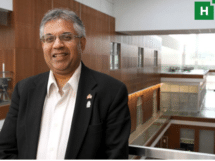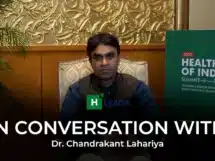Dr. Bishal Dhakal, Founder and CEO of Health at Home, a pioneering home healthcare service in Nepal, sheds light on the challenges and opportunities in this emerging sector for Southeast Asian countries.
According to the World Health Organization, Nepal is one of the world’s poorest countries with 45% of the population living below the poverty line. Apart from socio-economic factors and the mountainous terrain, susceptibility to natural disasters such as earthquakes, floods, and landslides as well as armed insurgencies, make the delivery of healthcare particularly complex in Nepal.
“Technology can help us address this challenge by taking quality, affordable healthcare services to people’s homes,” says Dr. Bishal Dhakal, Founder and CEO of Health at Home, one of the pioneers of home healthcare services in Nepal.
Here are edited excerpts from a video interview with the cardiac-surgeon-turned-social-entrepreneur on the need for hospital systems “to become like a pit stop in Formula One”, innovation in healthcare, vaccine hesitancy, and more:
How has the pandemic changed the health tech ecosystem in Nepal?
The pandemic impacted mobility and that was the biggest issue. Access to healthcare was broken, with no way to connect people to the medical system. However, people were very responsive to public health initiatives and campaigns. Telephone consultations became the norm, with the government launching a health hotline. Several civic organisations, including Health at Home, were active in terms of providing resources and mobilising care.
It made people rethink unnecessary hospital visits and follow-ups, and recognise the undervalued solutions that are already available. The concept of remote care has seen that kind of re-engagement.
Do you see a technology gap in healthcare? How can that be addressed?
There are laggards in technology adoption. But is technology the only thing that we’re looking at in healthcare? Despite all the hype around AI, ML and other technologies in Fintech, for example, are they able to enhance the financial processes?
Healthcare is a little different from other industries. We’re not using technology from the industrial model modus operandi or for system design enhancement. We can have a virtual university for education, but we don’t have a virtual hospital.
What we need in healthcare is a hybrid model and the pandemic has only helped fast forward the process. Along with technology, there has to be human interface. And that’s true even for virtual healthcare. We need to look at technology as a means to enhance access to care and improve people’s lives.
Why did you adopt entrepreneurship as a tool of change?
I’m a rebel! I was not happy with the fact that healthcare is bonded to the hospital system. Health at Home is one of the first integrated care models in Southeast Asia that provides an alternative model. This space is only going to evolve in the next decade and I’m very happy to be part of it.
Currently, our problem is the social structure, where corruption is ingrained. I think for every dollar we invest, 80% can be returned back to consumers in certain ways. As the doctors evolve and the technologies evolve, in another five to seven years, there will an interesting shift. Revenues will not be based on the subscriber model or the number of beds that hospitals have, but the kind of care that can be provided remotely. The governments, insurance companies, pharma companies and other stakeholders will see value in the new system.
What is Nepal’s biggest healthcare challenge?
Our challenge is geography. Our hills make it very difficult to ensure timely access to care because of mobility issues. In terms of infrastructure, we don’t have that much of a problem.
While I have a lot of resentment about donor-based government structures, I also believe that we have fantastic public health programmes for pregnant women, maternal care and newborn care. We need to improve our chronic disease management though. Over the next one or two years, I expect to see our remote monitoring or remote support programmes cover more ground.
How much of healthcare services can actually be provided remotely?
80% of hospital care can be provided at home. However, given our conservative medical educational system, doctors are bound to resist this change. So, there will be conflict, until doctors finally take ownership and get ready to step outside of the hospital system.
While emergency procedures and critical care will happen in hospitals, everything else will move out into people homes and remote care setups. The hospital system has to become like a pit stop in Formula One. It will still be there, but the efficiency will go up. A 50-bed hospital will be performing 150 surgeries and critical care procedures. Think about the efficiency in human resource management and the capital that we’re burning today!
With India and China adopting vaccine diplomacy to strengthen ties with Nepal, could you give us an insider’s perspective on the issue?
I’m not an expert on diplomacy, but as I understand the world, it’s good that it is diplomacy and not war! This is going to be a big issue. See how Italy, for example, is blocking the shipment of COVID-19 vaccine doses to Australia.
Any country that is outside of the system (that controls the international market) will face the challenge. You can call it a monopoly. It would have been better if the market would have opened up and we had a choice to buy from different sellers.
Healthcare is a human issue and we need to work together to ensure equal access to care. I’m vaccinated (in childhood and now for COVID), but it’s sad that 50% of doctors in Nepal may not opt for vaccination.
How do we handle this vaccine hesitancy?
First things first, we cannot equate vaccination efficacy in children with that in adults. It’s like comparing apples and oranges. Children can’t deny, adults can!
As far as the COVID vaccine is concerned, 50% efficacy is pretty good. But it could have been better, right? So, I think it’s fair if some people are hesitant about taking the shot. This is going to be an ongoing process in the public health domain.
What’s your word of advice to those who believe that the best medical care can happen only in hospitals?
It’s like trying to convince those who believe that God resides in temples, mosques, or churches, that He is everywhere. You can’t change that notion! In many ways, I think hospitals have been building up that notion of a religious cult.
We need to bring about a paradigm shift. And we will do it in the next five years.


















Add Comment